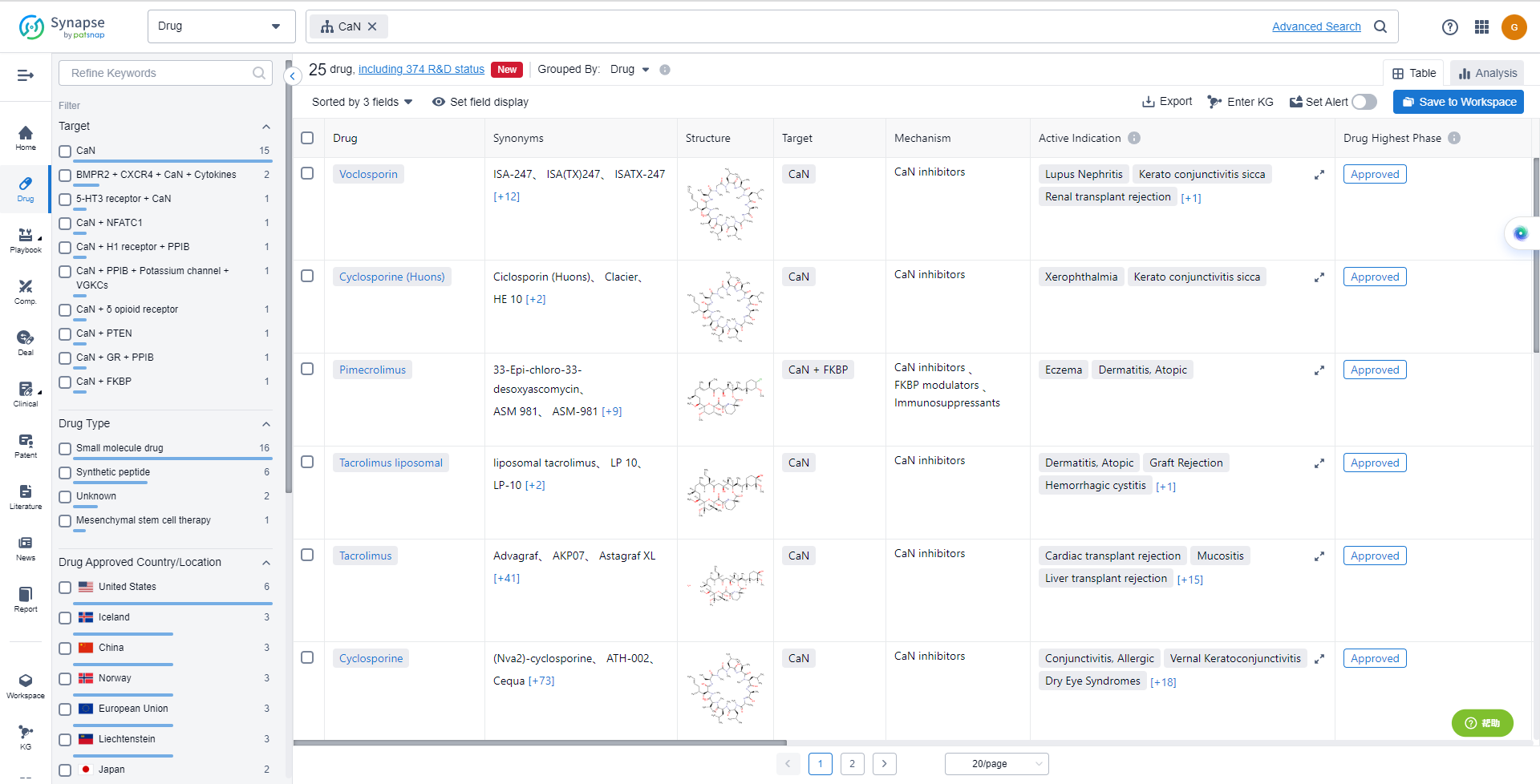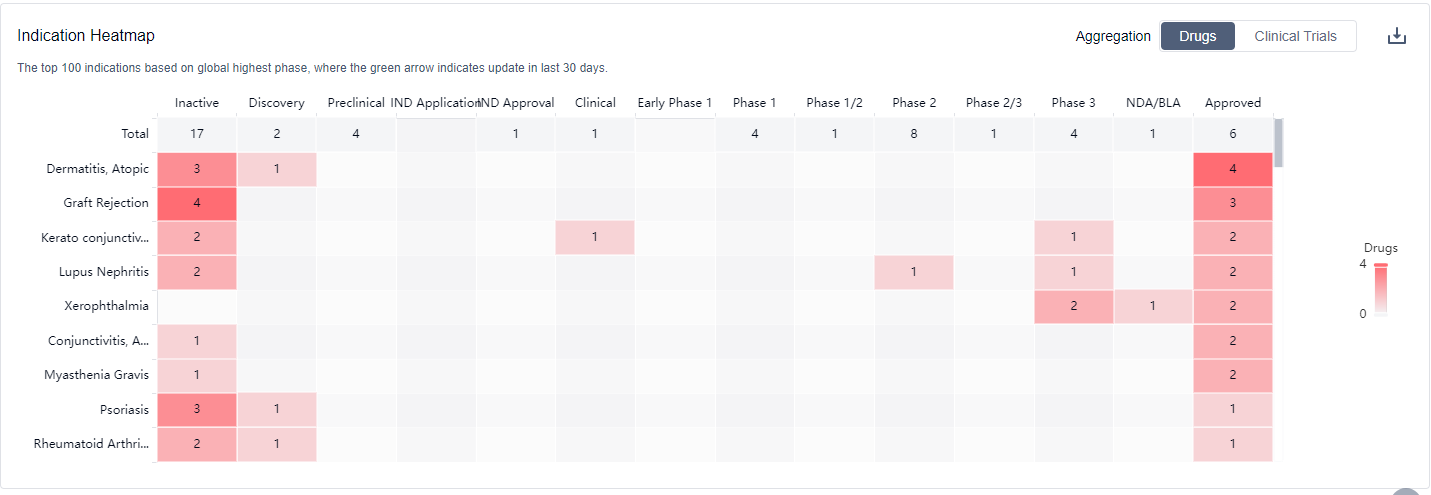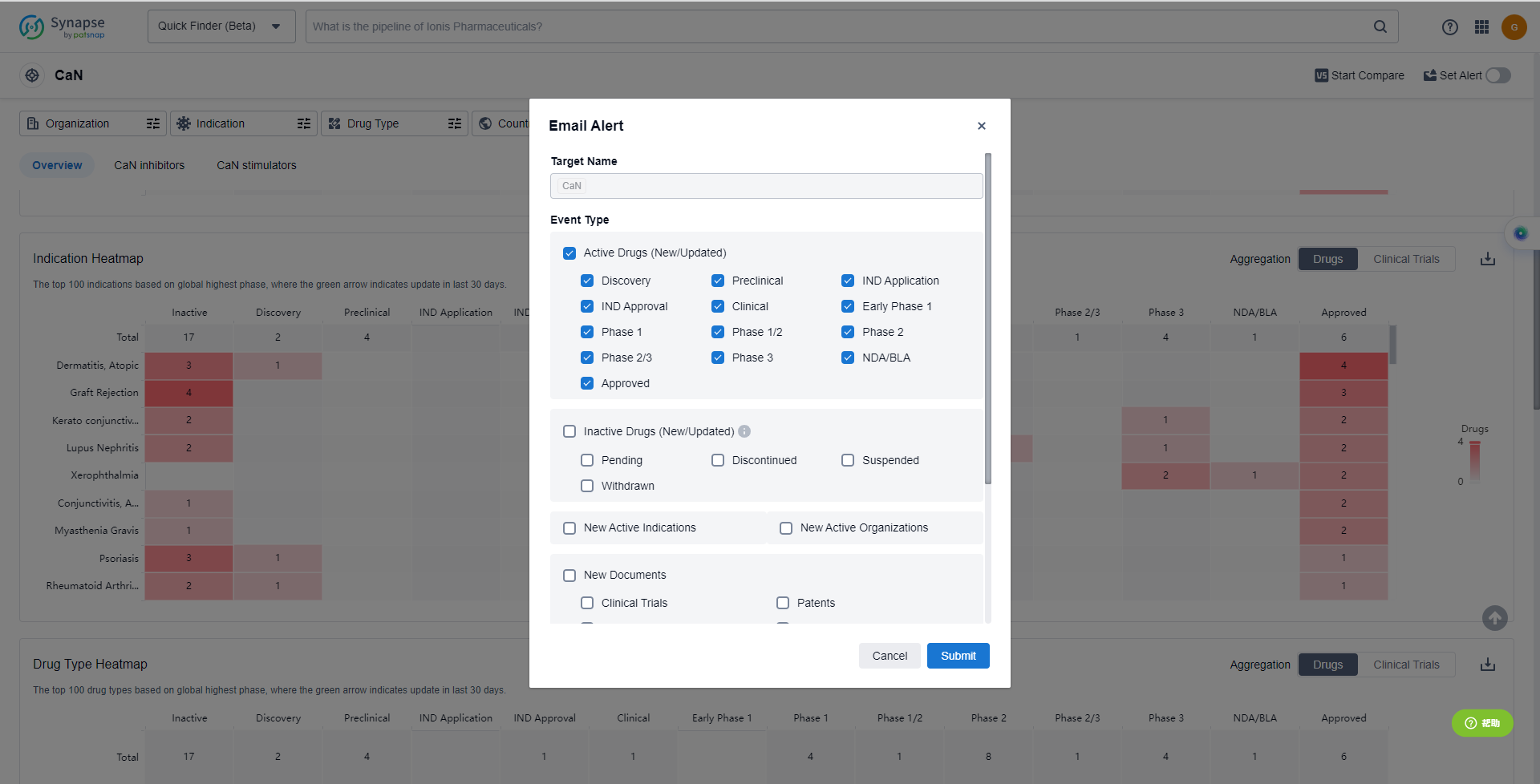What are calcineurin inhibitors and how do you quickly get the latest development progress?
CaN or calcineurin iis an assembly of phosphatases comprising a 61-kDa catalytic component that binds with calmodulin (termed calcineurin-A) and a 19-kDa regulatory component that interacts with calcium (known as calcineurin-B). This protein is involved in numerous cellular interactions and pathways for signal transduction dependent on calcium, including the triggering of T cells.
Calcineurin inhibitors, in essence, attach with high selectivity to particular intracellular receptors known as immunophilins, which include cyclophilin and FK binding protein. The inhibitory interaction between the drug and its receptor selectively and competitively obstructs the activity of calcineurin, which is stimulated by the release of intracellular calcium following the engagement and co-stimulation of T cell receptors from cells presenting antigens. This action consequently prohibits the progression of a group of transcription factors (NF-AT), causing a decrease in the transcriptional activation of cytokine genes such as interleukin (IL)-2, tumor necrosis factor (TNF)-alpha, IL-3, IL-4, CD40L, granulocyte-macrophage colony-stimulating factor, and interferon-gamma. Via selective inhibition of calcineurin, they obstruct the transcription of interleukin-2 and other cytokines within T lymphocytes thereby disrupting T cell trigger, proliferation and differentiation. Their primary action is on T-helper cells, but this in turn leads to the inhibition of T suppressor and T cytotoxic cells. They serve as immunosuppressants and concurrently, they extend a direct protective effect on podocytes, such as impeding the dephosphorylation of synaptopodin, a pivotal protein managing the actin filaments of the podocyte skeleton, induced by calcineurin. The inhibitors enhance the lifespan of podocytes and diminish their migratory behavior.
Novartis AG, Astellas Pharma, Inc., Sun Pharmaceutical Industries Ltd., LEO Pharma A/S, and Aurinia Pharmaceuticals, Inc. are the companies growing fastest under the target Calcineurin, with Novartis AG having the highest number of approved drugs.Dermatitis, Atopic and Graft Rejection are the most common indications with the highest number of approved drugs. Small molecule drugs and synthetic peptides are progressing rapidly under the target Calcineurin, indicating intense competition around the innovative drugs. The United States is leading in the development of drugs targeting Calcineurin, followed by the European Union, China, and other countries. China has shown progress in the development of drugs targeting Calcineurin, with several approved drugs and ongoing preclinical research.Overall, the target Calcineurin presents a competitive landscape with multiple companies, diverse indications, and various drug types. The future development of target Calcineurin is promising, with ongoing research and development efforts in different countries.
How do they work?
A CaN inhibitor refers to a type of drug or compound that inhibits the activity of the enzyme calcineurin (CaN). Calcineurin is a protein phosphatase that plays a crucial role in various cellular processes, particularly in the immune system. By inhibiting CaN, these inhibitors can modulate immune responses and have potential applications in the treatment of autoimmune diseases, organ transplantation, and certain cancers.
From a biomedical perspective, CaN inhibitors are of particular interest in immunology and pharmacology. They can interfere with the signaling pathways involved in immune cell activation, leading to immunosuppression. This property makes them valuable in preventing organ rejection after transplantation and managing autoimmune conditions like rheumatoid arthritis or psoriasis. Additionally, CaN inhibitors have shown promise in certain types of cancer, as they can inhibit the growth and proliferation of cancer cells.
It's important to note that the specific mechanism of action and side effects of CaN inhibitors may vary depending on the particular drug or compound being used. Therefore, it is crucial to consult with a healthcare professional for accurate and detailed information regarding the specific CaN inhibitor in question.
List of Calcineurin Inhibitors
The currently marketed CaN inhibitors include:
- Voclosporin
- Cyclosporine (Huons)
- Pimecrolimus
- Tacrolimus liposomal
- Tacrolimus
- Cyclosporine
- Ciclosporin liposomal
- Azasetron besylate
- DLQ-02
- Plerixafor/Tacrolimus
For more information, please click on the image below.
What are Calcineurin inhibitors used for?
Inhibitors of Calcineurin are used as an immunosuppressive treatment for autoimmune diseases like lupus nephritis, idiopathic inflammatory myositis, interstitial pulmonary disorders, atopic dermatitis, among others. For more information, please click on the image below to log in and search.
How to obtain the latest development progress of Calcineurin inhibitors?
In the Synapse database, you can keep abreast of the latest research and development advances of CaN inhibitors anywhere and anytime, daily or weekly, through the "Set Alert" function. Click on the image below to embark on a brand new journey of drug discovery!








